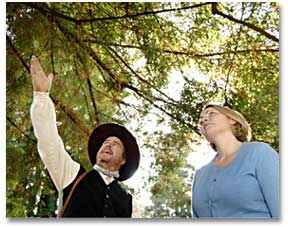|
|
 The Other Shoe |
Heavy Metal |
At peace in Yosemite
New HSU play commemorates the life of Eureka's
Carole Sund
by CYNTHIA E. GILMER
The mother never
finds her daughters, but she  finds
peace. Among the switchbacks, green, blue and brown collages
and El Capitan she relaxes into the clarity that only mountain
tops can bestow. That's the medicine John Muir prescribed, and
the waitress echoed, to the distraught mother who wandered the
woods of Yosemite in search of her daughters. Alone, the spirits
of the magnificent keep her company.
finds
peace. Among the switchbacks, green, blue and brown collages
and El Capitan she relaxes into the clarity that only mountain
tops can bestow. That's the medicine John Muir prescribed, and
the waitress echoed, to the distraught mother who wandered the
woods of Yosemite in search of her daughters. Alone, the spirits
of the magnificent keep her company.
"Only the truly magnificent rest here," Ariel the waitress, played by Rachael Brink, said to the woman.
Left: John Muir (James Hitchcock) Urges Ellen (Leslie Hundley-Ostrom) to "Climb the mountains and get their good tidings." Photo Courtesy HSU
In Range of Light, a new play inspired by the life of Carole Sund, the majesty of Yosemite and the horrors that took place there seven years ago are brought to the stage so people may remember and celebrate the lives of the local women who lost their lives there. The play, written by Eureka playwright Wendy Williams, opened last week and is garnering national attention.
Most remember Sund as the Eureka woman murdered in Yosemite National Park in 1999. Here in Humboldt County, though, those who knew her remember her as a woman dedicated to children's rights who made a positive impact on her community.
Williams, a 20-year Humboldt County resident, wrote the play because she knew Sund, who helped her with the adoption of her daughter. She said that Sund was very kind to her.
"I always wanted the emphasis to be a celebration of her life versus a standard murder/crime piece," Williams said.
Sund worked with the Council of Adoptable Children and Court Appointed Special Advocates, which trains court representatives for foster children. In 1999, she went on vacation in Yosemite with her 15-year-old daughter Juli and Juli's 16-year-old friend, a foreign exchange student from Argentina named Silvina Pelosso. The family was later due to rendezvous with her husband Jens in San Francisco, but never did.
In the following months of the investigation of Sund's case, police still lacked leads in the case. Then another missing person from Yosemite was reported. Naturalist Joie Ruth Armstrong, 26, worked at the park, and her murder re-opened the case. That's when the FBI assumed the case, suspecting that a serial killer targeted the park.
Re-examining suspects from the first round of routine questioning, the hotel handyman emerged as a potential culprit. After an interrogation with the FBI, Cary Stayner confessed to the four murders during an interview with a news reporter in Sacramento.
Seven years later, back in Humboldt County, Range of Light Director Susan Abbey realized the challenge of dealing with a topic sensitive to the people that live here. Abbey moved to the area four years ago from Utah but is aware that, though seven years old, the story remains "an emotional hotbed and had to be handled just right," she said.
An unusual aspect of Range of Light is the way that Williams invokes the spirit of John Muir, the early naturalist and champion of Yosemite. In the play, Muir's spirit, which rests in the land he so loved, serves as a guide to the Sund character, who sets out into the park to find her missing children.
One challenge was to find an actor to fill Muir's shoes. For this, Abbey placed a call to someone she worked with at Redwood Curtain, a local theater company. At the time, thespian James Hitchcock was out of town. Unbeknownst to him, he was actually in rehearsal. A week later Hitchcock returned from Yosemite to don the role.
Complete with dialect, walking stick and blunt demeanor, Hitchcock might have summoned Muir's spirit back to Arcata. He even sings with Scottish trill and wears his pants nearly up to his armpits.
The play illuminates the dynamic dimensions of a post-liberation woman. Ellen, the Sund character, played by Leslie Hundley-Ostrom, has rekindled the romance of motherhood, but grapples with the inevitable struggle of caring for and controlling maturing children.
The setting, what Muir called "nature's church," evokes the timeless allure of the untamed struggle of man versus nature. The concerned mother from a city searches the woods for her daughters -- and herself -- as she faces the elements. With 18 scenes in an hour-and-fifteen-minute play, the story moves steadily, allowing the past, present and future to unfold simultaneously.
Flashbacks to her hometown, presumably Eureka, show Ellen's pacing parents. Her mother's gut wills her to worry as her daughter's rental car becomes overdue. Details of existence baffle the husband/father as he reads directions on how to operate the washing machine. The niche where a mother once was is empty.
Williams intended to write a tribute to the minutiae of motherhood. Her inspiration illustrates Sund's impact on the world -- an example of how everyone can make a difference in their home and community.
"Even the little, everyday acts of kindness can lead to greatness," Williams said.
As in most families, the family in the play revolves around the mother. She feels blighted in her efforts to connect with her teenagers. The more she wants to hang out with her daughters, the more her daughters want to be independent. On vacation, her role is to pay the check.
The steady presence of Muir anchors the storyline and the mother. The classic wisdom of his one-liners begins to penetrate the mother's sorrow, and also provide lessons that the audience can take home.
"There can be no happiness for those who cannot be happy here," Muir's character says.
He explains how people live on the Earth, not in the world, which leaves most of us "rigidly alone." But the naturalist sees the unfolding of each day in the beauty of being wild, with death as a change in the form of beauty. In the mountains they seek clarity, and the companionship of nature and peace.
The abstract set of hodgepodge colors becomes a restaurant, a home, a forest. Drapes soften the angles from the crafted-plywood hills and add an ambiance of elegance. The stage lights on Ellen's face shape-shift into sun rays shining through tree limbs as she moves the audience with her last monologue.
Williams said that writing this play was very emotional, but gave her a good sense of catharsis. Since she worked with Sund on a personal level, she felt compelled towards a eulogy -- but also honesty, with the duality of celebrating life and mourning death.
"If it's based on a real person, you want to do them justice, but you don't want to sanitize anything," she said.
Range of Light has been entered into the Kennedy Center American College Theater Festival, where it will compete with other college productions. The play may be a part of the Center's regional festival, and afterward could go on to show in Washington, D.C., next spring.
As for the Sund case, Stayner received the death penalty in 2002, although he pleaded insanity. He is on death row at San Quentin State Prison.
Sund's family created the Carole Sund/Carrington Memorial Reward Foundation to honor their daughter, so she can continue making a difference. The foundation helps offer rewards for missing persons and publicizes pictures of those missing and suspected abductors.
In 1894, John Muir wrote The Mountains of California. He spent seasons in the Sierra Nevada and saw hues of morning and evening light dancing in bands across the bright granite mountains. He nicknamed the region "Range of Light," and in Williams' telling, it becomes a place for the "truly magnificient" -- souls like Muir and Sund -- to find peace.
Thurman Wilkins, author of John Muir: Apostle of Nature, writes that when Muir first saw Bridalveil falls from afar in 1868, he thought it was 20 feet, or perhaps 60 feet, high. It's actually 600. Like Muir's realization, this play allows an altered perspective to show how great the ripples from one fall are.
Range of Light opened Oct. 12 in Humboldt State's Van Duzer theater and will continue this Thursday through Saturday, Oct. 19-21. Show starts at 7:30 p.m. $10 general admission; $8 seniors and students; HSU students free. For more information, call 826-3928.
Cynthia E. Gilmer is a journalism student at HSU. She has a double major in environmental science.
COVER STORY | IN THE NEWS | DIRT | ARTBEAT
TALK OF THE TABLE | THE HUM | CALENDAR
Comments? Write a letter!
© Copyright 2006, North Coast Journal, Inc.

